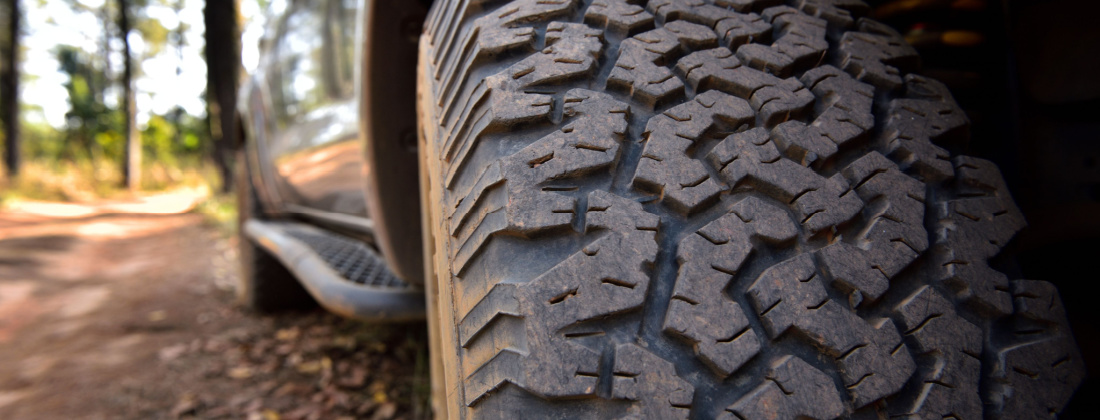
Do you want to outfit your automobile for off-road adventures? Are the “all-terrain” tires on your brand-new 4WD not as durable as you had hoped? You can get all the details you want right here! From who should use all-terrain tires to how to choose the best ones for you, we will walk you through it all.
This guide will inform you about All Terrain Tires in detail.
All Terrain tires are special tires made to operate on and off-road, offering grip and comfort in dry, wet, and mild snowy situations. They function as a cross between mud and highway tires, giving you a comfortable ride on the pavement and a dependable grip on the hills! Also, All-terrain tires are more durable and have wider treads than standard tires, yet they are also secure for driving in cities and perform well on paved roads.
All-terrain tires and mud-terrain tires are combined to create hybrid tires. Although they can provide some increased off-road performance, they are comfortable for road usage.
The hybrid tire, which contains characteristics of a mud tire, is among the most well-liked in the off-road world because it provides excellent performance in mud and wet conditions while still allowing for comfortable short-distance road driving. Another great option if you realize that you will need your vehicle for both ordinary driving and off-road adventures is the hybrid type tire.
Manufacturers specifically design tires for muddy terrain to handle rougher terrain; they have thick treads, making them great for use in off-road and muddy areas. Thanks to these tires’ more extensive water evacuation channels, you can drive in really wet circumstances.
As you travel over challenging terrain, they also have the added performance to guarantee that your tires have a substantial degree of tread. Although this tire is a genuine off-road performance tire, it can make a louder noise when driving on hard terrain because of the deeper depressions in the tire wall.
The layout of the treads – All-terrain tires with an open tread give better traction in off-road situations and adequate handling on regular roads.
Strengthened sidewalls – Sidewalls can increase your vehicle’s capacity to haul loads and can withstand demanding off-road use.
All-Season Usability – All-terrain vehicles can operate all year long without installing weather-specific tires since they can manage common road conditions, off-road situations, and icy surroundings.
Loud Ride – Air doesn’t pass between the grooves as easily because of the tread pattern, which produces a more audible noise than conventional tires.
Reduced tread life – All-terrain tires often have a shorter tread life due to the rubber’s softness. Every 65,000 km, all-terrain tires may need to be changed.
Reduced fuel efficiency – All-terrain tires are less fuel efficient since they are so heavy-duty.
The ideal vehicles for all-terrain tires include SUVs, pickup trucks, and light trucks. However, as long as automakers keep adding off-road characteristics to automobiles, more all-terrain tires for sedans and SUVs will appear.
While buying the best all-terrain tires, you need to look at multiple characteristics, a few of them are:
The tread, one of the tire’s most noticeable components, is crucial for gaining traction on and off-road. The tread blocks on conventional highway tires are closely spaced and have little depth.
While this makes for a calm and comfortable ride on the highway, it is in no way suitable for the difficulties of trail riding. Road terrains are readily rendered impractical in terms of traction by dirt, pebbles, mud, and snow wedged between the tread blocks. The aggressive tread of an all-terrain tire is built to withstand these common terrain conditions.
The sidewall is one of the most frequently disregarded parts of off-road tires. A tire’s sidewall must shield it from twigs or sharp edges that might puncture it, retain the tire’s shape under heavy loads, and across uneven terrain.
Highway tires typically feature thin sidewalls meant to support the weight of the automobile while still flexing enough to offer a comfortable and smooth ride over the road. The sidewalls of all-terrain tires are thicker and more rigid, designed to bend over obstacles and provide better protection from the dangers of off-road driving, amplifying this impact.
The real beauty of towing on all-terrain tires is how easily you can go from driving your truck on the freeway with no cargo to driving it heavily laden in the dirt. All-terrain vehicles keep up with the pace.
Your vehicle’s performance is directly correlated with the size of the tires you have on it, just as it is with how it appears. One of the crucial components to consider when equipping any vehicle is the tire size, which is much more critical for off-road capable trucks and SUVs.
Since all-terrain tires are designed with a softer material, they typically wear out quicker than some other tires. The typical AT tire will last about 65,000 kilometers before needing to be changed with proper inflation, routine tire rotations, and balancing. While all-terrain tires, such as the Goodyear Wrangler, BFGoodrich All Terrain, or Toyo Open Country might not last as long as a conventional all season, they will perform as expected, if used as intended.
All Terrain tires are often known as mountain tires or off-roading tires that give you the best experience. They provide extra comfort making your riding journey more enjoyable. However, they do come with setbacks. If you intend to install all-terrains on your vehicle we highly recommend speaking with a tire specialist in Moon Lake at Tirecraft Drayton Valley before purchase.
Are you seeking the best quality all-terrain tires for your 4×4 off-roading truck or car? If so, then you have found the right spot. Tirecraft Drayton Valley, Moon Lake offers you the best quality tires and many more services.
We appreciate our loyal customers and exceptional personnel for their hard work and commitment to our business. Tirecraft Drayton Valley would not be where it is today without any of you.
So why wait? Call us today to get started.